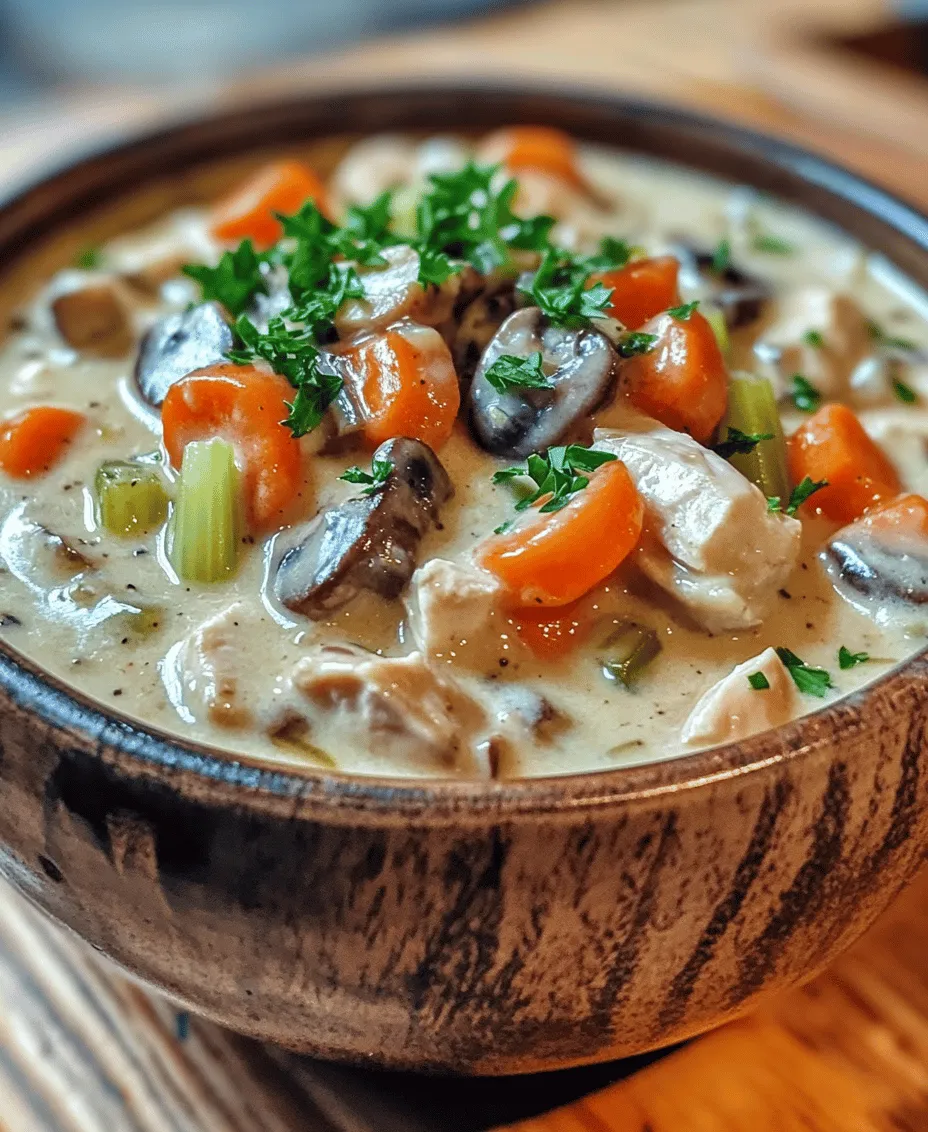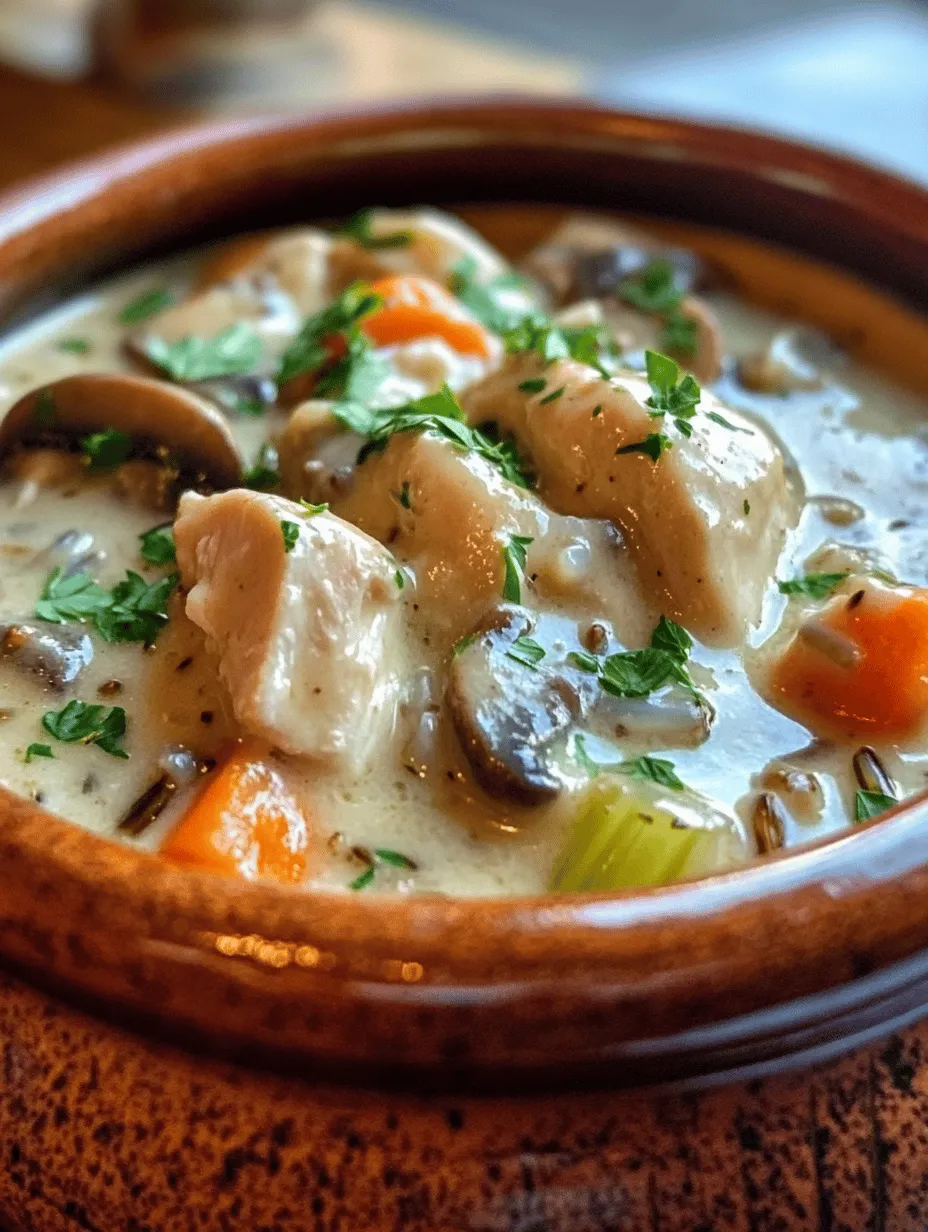Introduction to Creamy Mushroom Chicken and Wild Rice Soup
As the temperature begins to drop and the days grow shorter, there’s nothing quite like a warm, hearty bowl of soup to bring comfort and nourishment to your table. One such delightful dish is Creamy Mushroom Chicken and Wild Rice Soup. This delectable soup marries the rich flavors of tender chicken, earthy mushrooms, and wholesome wild rice, creating a meal that is not only satisfying but also brimming with flavor and nutrition.
Homemade soups have an unparalleled charm, especially during colder months when they can warm you from the inside out. The slow simmering of ingredients allows the flavors to meld beautifully, resulting in a comforting dish that can be enjoyed by the whole family. This particular recipe stands out not just for its creamy texture and delicious taste, but also for its ability to provide essential nutrients that support a healthy lifestyle.
The Allure of Creamy Mushroom Chicken and Wild Rice Soup
Creamy Mushroom Chicken and Wild Rice Soup boasts a complex flavor profile that is both rich and savory. The combination of sautéed garlic and onions, the earthiness of mushrooms, and the subtle sweetness of carrots creates a symphony of taste. Each spoonful is a warm embrace, making it an ideal dish for gathering around the table with loved ones.
Using fresh ingredients is crucial for achieving the best flavor in this soup. Fresh vegetables not only enhance the taste but also contribute to the nutritional value of the dish. Wild rice, in particular, offers a nutty flavor and chewy texture that pairs perfectly with the creaminess of the soup, while chicken provides lean protein essential for a balanced diet.
There are also significant health benefits to the key ingredients in this recipe. Mushrooms are a powerhouse of nutrients, containing antioxidants and vitamins that support immune health. They are low in calories and high in fiber, making them an excellent addition to any meal. Wild rice, in contrast to white rice, is a whole grain that is rich in protein, fiber, and essential minerals, providing a hearty base for this comforting soup.
Understanding the Key Ingredients
Chicken: Selecting the Best Cuts for Tenderness and Flavor
When preparing Creamy Mushroom Chicken and Wild Rice Soup, the choice of chicken is vital for ensuring tenderness and robust flavor. While boneless, skinless chicken breasts are a popular option due to their lean nature, many cooks prefer using thighs for their juiciness and depth of flavor. Thighs contain more fat than breasts, which helps to keep the meat moist during cooking, resulting in a rich and satisfying soup.
For this recipe, you can either dice the chicken into bite-sized pieces or leave it whole and shred it after cooking. If you opt for whole pieces, consider searing them first to develop a golden crust that adds depth to the overall flavor of the soup.
Wild Rice: Nutritional Benefits and Cooking Tips
Wild rice is an essential ingredient in this recipe, providing a unique texture and a host of health benefits. Unlike regular white or brown rice, wild rice is not actually rice but a semi-aquatic grass that produces edible seeds. It is packed with nutrients, offering a good source of fiber, protein, and antioxidants. Additionally, wild rice is gluten-free, making it a suitable option for those with gluten sensitivities.
When cooking wild rice, it is essential to remember that it takes longer to cook than white rice. Typically, wild rice requires about 45-60 minutes to become tender. To achieve the best results, rinse the wild rice thoroughly before cooking to remove any debris and excess starch. Use a ratio of 1 cup of wild rice to 3 cups of water or broth for optimal cooking.
Vegetables: The Role of Onions, Garlic, Carrots, and Celery in Enhancing Flavor
The foundation of this soup is built upon a medley of aromatic vegetables: onions, garlic, carrots, and celery. Known as the “mirepoix,” this combination is a staple in many soups and stews, providing a depth of flavor that elevates the entire dish.
Onions and garlic are particularly important; they release their natural sugars and create a sweet, savory base when sautéed. Carrots add a hint of sweetness and a pop of color, while celery contributes an earthy crunch. Together, these vegetables work in harmony to create a flavorful broth that complements the creamy richness of the soup.
Mushrooms: Varieties Used and Their Health Benefits
Mushrooms are the star of this soup, providing both texture and flavor. There are several varieties that work wonderfully in this recipe, including cremini, shiitake, and button mushrooms. Each type offers its unique flavor profile; for instance, cremini mushrooms have a deeper, earthier taste compared to the milder flavor of button mushrooms.
Aside from their delicious taste, mushrooms are renowned for their numerous health benefits. They are low in calories, high in antioxidants, and a good source of B vitamins, which are essential for energy metabolism. Additionally, mushrooms contain compounds that may help boost the immune system and reduce inflammation, making them a valuable addition to your diet.
Heavy Cream: Alternatives and Their Impact on the Soup’s Texture
The creamy texture of the soup is achieved through the use of heavy cream, which adds richness and a velvety mouthfeel. However, if you are looking for lighter alternatives, you can consider using half-and-half, coconut milk, or even cashew cream for a dairy-free option. Each alternative will impart a slightly different flavor and texture to the soup, so choose based on your dietary preferences and taste.
Using low-fat milk or yogurt can also work in a pinch, but be cautious as these options may alter the consistency and richness of the soup. If you opt for a lighter alternative, you might want to thicken the soup with a cornstarch slurry or by blending a portion of the soup to maintain a creamy texture.
Step-by-Step Guide to Making Creamy Mushroom Chicken and Wild Rice Soup
Preparation: Importance of Mise en Place
Before diving into the cooking process, it is crucial to organize your ingredients through a technique known as mise en place, which means “everything in its place.” This preparation step ensures that all your ingredients are prepped and ready to go, making the cooking process smoother and more efficient.
Chop the vegetables, dice the chicken, and measure out the wild rice and other ingredients before you start cooking. This way, you can focus on the cooking process without interruptions, allowing you to create a delicious soup with ease.
Cooking Chicken: Techniques for Achieving the Perfect Sauté
To achieve maximum flavor, start by sautéing the chicken in a large pot over medium-high heat. Heat a tablespoon of olive oil or butter until shimmering, then add your diced chicken. Ensure not to overcrowd the pan, as this can lead to steaming rather than sautéing. Cook the chicken until it is golden brown on all sides and cooked through—about 5-7 minutes.
Once the chicken is cooked, remove it from the pot and set it aside. This step ensures that the chicken retains its flavor and juices, which will later be incorporated back into the soup.
Sautéing Vegetables: Timing and Order of Adding Ingredients for Optimal Flavor
After cooking the chicken, it’s time to build the soup’s flavor by sautéing the vegetables. In the same pot, add a little more oil if needed and toss in the onions and garlic. Sauté them for 2-3 minutes until the onions become translucent and fragrant. This is the foundation of your soup’s flavor.
Next, add the carrots and celery, continuing to sauté for an additional 3-4 minutes. Once the vegetables are tender, incorporate the mushrooms, stirring occasionally until they are cooked down and golden brown. This process helps to deepen the flavors and allows the ingredients to meld together, setting the stage for a rich and satisfying soup.
In the following sections, we will delve deeper into the complete cooking process, including how to combine the key ingredients to create the perfect Creamy Mushroom Chicken and Wild Rice Soup that will leave everyone asking for seconds.


